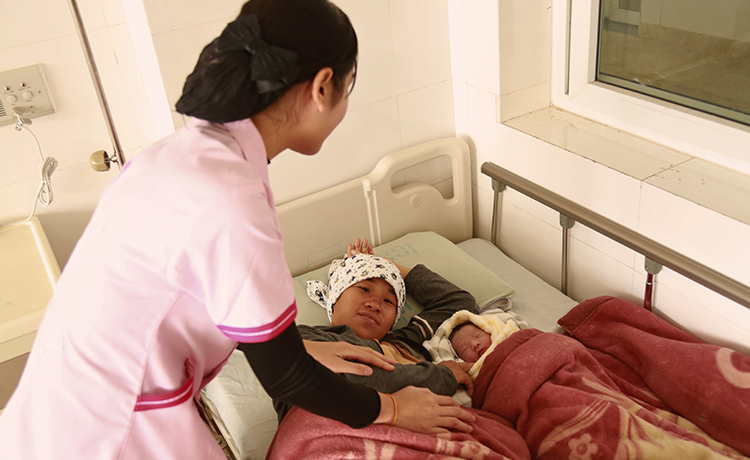News
Heroes in pink: Lao midwives supporting rights and saving lives
- 29 January 2024
News
XIENG KHOUANG PROVINCE, Lao People’s Democratic Republic – “I can’t wait to graduate and become a practising midwife. I am passionate about deliveries and I love babies a lot,” said 20-year-old midwifery student Aspy Kamsing.
In her last year at the College of Health Sciences in the northeastern Xieng Khouang province, Ms. Kamsing is almost ready to join an expanding cadre of professional midwives. Once she graduates, her services will be in high demand; recent research points to the need for nearly 6,000 trained midwives across the country in the next six years. In 2019, there were just 1,834 in total.
It’s a national trend that reflects a wider global one. Around the world, midwives are in too-short supply and urgent demand. UNFPA, the United Nations sexual and reproductive health agency, estimates a global shortage of nearly 1 million midwives, despite these providers’ critical role in ensuring essential sexual and reproductive health services and their potential to save millions of lives.
“If every pregnant woman had access to a well-trained, caring midwife, we would be much closer to a world where every childbirth is safe,” said UNFPA Executive Director Dr. Natalia Kanem.
Enabling informed choices
Great strides have been made towards protecting the lives of Lao mothers during pregnancy and childbirth. Between 2000 and 2020, the country’s maternal mortality rate fell by over 250 per cent – one of the largest percentage reductions in the world.
Yet challenges persist, especially among remote and rural populations, who often struggle with limited access to sexual and reproductive health services. In Xieng Khouang, rates of early marriage and pregnancy are high; according to 2017 data, one in four women aged 15 to 19 was married or in a union, and one in five women of the same age group were either pregnant with their first child or had already given birth.
These issues present risks for Lao women and girls, especially as complications from pregnancy and childbirth stand among the leading drivers of death in adolescent girls globally.
Midwives, though, can help prevent these needless tragedies. They do this not only through critical sexual and reproductive health interventions, but also by supporting their patients every day through labour and delivery, family planning decision-making and the pursuit of rights and choices. This advice and information helps to empower women and girls to live longer, healthier lives.
“I have learned how to talk about sexual and reproductive health with adolescents, youth, women and couples,” said Panin Chanthavong, another second-year student in the College of Health Science’s midwifery diploma programme. “Now I am confident in helping them to make informed choices about their bodies.”

Accelerating progress
Every year, about 200 students graduate from the country’s three internationally-accredited midwifery colleges – the first to receive the distinction in the Asia-Pacific region, with the process supported by UNFPA.
“Establishing the higher diploma in 2019 added another dimension to the practice of midwifery, levelling up their learning,” midwifery teacher Phout Sidavong told UNFPA. “After graduation, some midwives join the public sector; some prefer to work in private clinics. But we always select students from vulnerable areas so that they can go back and support their communities.”
Across many remote and hard-to-reach Lao communities, a shortage of trained health providers jeopardizes access to family planning and sexual and reproductive health services – endangering the lives of women and girls. Midwives like Ms. Kamsing are excited to fill this gap.
“I am proud to be able to help women in my village,” Ms. Kamsing said.
As part of her studies at the College of Health Sciences, Ms. Kamsing currently works at Xieng Khouang central hospital as an intern. Ms. Chanthavong is also there and has helped support three deliveries at the hospital already.
“The local population really trusts midwives,” she told UNFPA. “I love being a midwife.”